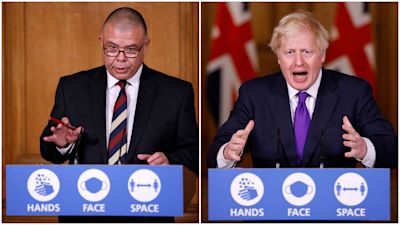Covid: Prof Van-Tam warns virus will 'be with humankind forever' as PM hails vaccine as key to normal life

Video report by Health Editor Emily Morgan
Coronavirus is "going to be with humankind forever" despite the approval of a vaccine for use in the UK, the government’s deputy chief medical officer has warned.
While Professor Jonathan Van-Tam welcomed the "momentous journey" in the development of Pfizer’s vaccine, he does not believe the virus will be wiped out completely.
Speaking at the government’s coronavirus press conference, which was led by the Prime Minister Boris Johnson, Prof Van-Tam said: “I don’t think we are going to eradicate coronavirus ever.
“I think it’s going to be with humankind forever. I think we may get to a point where coronavirus becomes a seasonal problem.
“I don’t want to draw too many parallels with ‘flu, but, possibly, that is the kind of way we would learn to live with it.”
However Mr Johnson believes the approval of the Covid-19 vaccine means the UK can be "sure and certain" of a return to normality by spring next year.
The public will not need to adhere to social distancing indefinitely, Prof Van-Tam said, but some habits will “perhaps persist.”
“Do I think there will come a big moment where we have a massive party and throw our masks and hand sanitiser and say ‘that’s it, it’s behind us’, like the end of the war? No, I don’t,” he said.
“I think those kind of habits that we have learned from… will, perhaps persist for many years, and that may be a good thing if they do.”
But Mr Johnson responded, saying: “And, maybe… on the other hand, we may want to get back to life as pretty much as close to normal.”
The prime minister said scientists had performed "biological jujitsu" to quickly develop and approve a coronavirus vaccine, with the first batch being sent out to 50 hospital hubs across England "next week".
The roll out of the jabs will be the "biggest programme of mass vaccination in the history of the UK", Mr Johnson said.
But "it will inevitably take some months before all the most vulnerable are protected - cold long months".
Prof Van-Tam said the Pfizer/BioNTech vaccine was a “complex product with a very fragile cold chain.”
“It’s not a yoghurt that can be taken out of the fridge and put back in multiple times,” he told a Downing Street press conference.
“It’s really tricky to handle.”
Mr Johnson welcomed the approval of the vaccine, but said it is "vital" that "as we celebrate this scientific achievement we are not carried away with over optimism or fall into the naive belief that the struggle is over".
"It is not," the PM added.
A combination of community testing, vaccines and social distancing measures were still necessary, he said.
"We are no longer resting on the mere hope that we can return to normal next year, in the spring, but rather the sure and certain knowledge that we will succeed and together reclaim our lives and all the things about our lives that we love," he added.
Sir Simon Stevens, chief executive of NHS England, said some vaccination will take place next week, with 800,000 doses on their way to the UK, but the bulk will take place in "January through to March or April for the at-risk population".
In the meantime, Mr Johnson said tiered coronavirus restrictions will continue to be in place, and people will have to continue making "sacrifices to protect those we love ".
Watch ITV News Health Editor Emily Morgan and Science Editor Tom Clarke on News At Ten with Tom Bradby:
Sir Simon said the the majority of early vaccinations - expected to happen in December - will be for be for the over-80s and care home residents.
He added: "Since you need two jabs with an initial injection and then a booster given to you around 21 days apart that means that we've got to reserve the second dose for the people who are getting the first dose in December to make sure that that second dose is available for them."
He said people will be informed if they're to be vaccinated next week.
Mr Johnson, at PMQs, said Covid-19 vaccines will allow Britons to "reclaim our lives", but he acknowledged "logistical challenges" presented by the need to store the vaccine at -70 degrees.
The UK has ordered 40 million doses of the Pfizer vaccine, enough to vaccinate 20 million people with two doses, given 21 days apart.
How can the Pfizer vaccine been transported from Belgium to people's arms?
Health Secretary Matt Hancock said 800,000 doses of the jab will arrive next week, with millions more arriving in the coming weeks.
Mr Johnson's newly appointed press secretary, Allegra Stratton, earlier said the PM would not rule out being vaccinated live on TV, in order to prove its safety to sceptics.